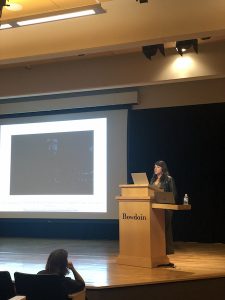Coordinate Major: Government & Legal Studies
Summer was introduced to the Digital and Computational Studies department through a roommate as a first-year. They attended an on-campus talk about Spotify and Big Data. Intrigued by the topics discussed, Summer enrolled in Intro to DCS the following semester. The next year, Summer declared a DCS major with a minor in Government & Legal Studies.
During her time at Bowdoin, Summer recalls many formative moments within the DCS department. Despite being held in a pandemic, Summer recalls Professor Johnson’s course Digital Filmmaking as one of her favorites. She was particularly intrigued with digital storytelling during an intrinsically digital time and enjoyed how DCS and Cinema Studies were merged.
Although she has positive things to say about all of the professors, Summer especially enjoyed her time with professors Nascimento and Hall. She compliments their teaching styles and believes that their professional backgrounds before Bowdoin are complementary and highly relevant to the courses they taught.
For Summer’s capstone project, she focused on using digital tools to analyze presidential speeches about crime. In doing so, she says that she was able to identify historical moments in speeches that could’ve shifted rhetoric about crime. Additionally, she found that crime is talked about more negatively than most other presidential issues. As a student interested in criminal justice before coming to Bowdoin, Summer’s capstone was an avenue to further explore the subject.
As Summer transitions into her career outside of Bowdoin, she feels prepared to take on the challenges ahead. Summer is moving to Denver, Colorado, to work as a paralegal at a public defender’s office. “DCS courses are an environment that fosters critical thinking about every topic, aside from the ones that might be my favorite.” Furthermore, Summer mentions how the department’s emphasis on mentorship makes working with other professionals more comfortable. Finally, Summer notes how familiarity with digital tools such as those used in her classes allowed her to stand out and be prepared for the role.
